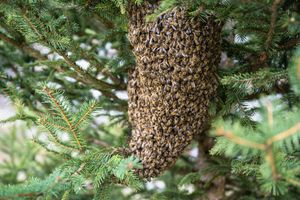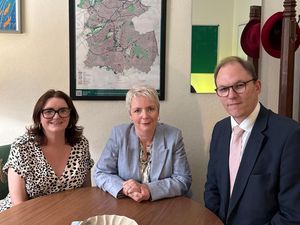BPCA backs Swarm Savers campaign to protect native bees in the West Midlands
Experts at British Pest Control Association (BPCA) are urging homeowners in the West Midlands to help honey bees find a home as part of the annual Swarm Savers campaign by British Beekeepers Association (BBKA).
In spring, swarms of honey bees across the UK will start taking flight as colonies divide and seek new homes.
But up to 80% of swarms will perish if they cannot locate a safe place in which to settle down.
Niall Gallagher is Technical Manager at BPCA. He said: “Swarm Savers is an initiative in which thousands of trained beekeepers across the country are on stand-by to safely rescue and rehome honey bee swarms.
“Members of the public have a key role to play in alerting local beekeepers to swarms that are on the move.
“Bees are a vital part of our ecosystem, but sometimes a swarm of honey bees can be mistaken for a wasp infestation, resulting in a call to a BPCA member.
“All BPCA members will protect pollinators where we can, and will often work with members of the BBKA to ensure honey bees are safely relocated.”

Residents who come across a swarm of honey bees are advised to follow three simple steps issued by the BBKA:
Stay calm. Swarming honey bees are usually docile, despite the noise and size. Their main focus is to protect their queen
Keep a safe distance and do not attempt to move or destroy the swarm
Correctly identify the species – you can do this at: Swarm Collection | British Beekeepers Association. If you are unsure, take a clear photo and contact a BBKA swarm collector
Chair of the BBKA, Diane Drinkwater said: “There’s something truly magical about witnessing a honey bee swarm.
“It’s how a colony reproduces; a natural marvel where thousands of bees work together to protect their queen and find a new home. But without help, many never make it.
“We know many people are fascinated or concerned by swarms and by knowing what to do, everyone can help honey bees and make sure they’re around for generations to come.”
BBKA beekeepers are the first port of call for honey bee swarms but are unable to help with the removal of nests for other species of bees found in the UK – of which there are more than 250.
Later in the summer, when wasp nests can become an issue, residents should contact a BPCA member for assistance.
Niall Gallagher added: “As part of a responsible pest management industry, we’ve pledged to educate customers on the benefits of pollinators, their behaviours and their lifecycle.
“Some of our members have specialised skills in removing nests from tricky places such as chimneys and wall cavities.
“In the UK, 25% of all bee types are endangered, so pest controllers do not apply treatments unless there is a serious threat to human life.
“We encourage residents concerned about bees to explore all available options before considering treatment, but if there is a serious risk, we strongly advise contacting a BPCA member.”
BPCA member businesses are endorsed by the Government via the TrustMark quality scheme as they must carry the correct insurances and are trained and qualified technicians who are assessed to the British Standard in pest management EN 16636 and follow BPCA’s Codes of Best Practice.
To find a BPCA member visit: bpca.org.uk/find




